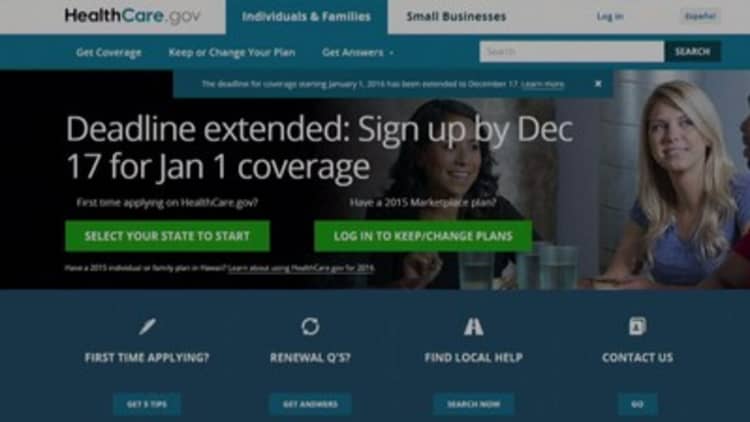The sky didn't fall when Obamacare went into effect — and the number of people working part-time didn't rise, either.
A new study further undercuts a major claim by critics of the Affordable Care Act, who contended that the law would encourage companies to slash full-time workers' hours and shift them into part-time work in order to avoid having to offer them health insurance.
The research "found little evidence that the ACA had caused increases in part-time employment as of 2015," according to a summary of the findings published in the journal Health Affairs on Tuesday.
"We can say with a large degree of confidence that there is nothing we can see nationwide when we look at the whole workforce" that would support a claim that the so-called employer mandate or other Obamacare features have led to increases in part-time employment at the expense of full-time jobs, said Kosali Simon, a professor at Indiana University, and a co-author of the report.
Simon noted that even the slight shifts to part-time employment from full-time jobs — of just about 0.5 percent from 2013 to 2015 — in two subgroups could not be attributed to the Obamacare employer mandate. Those subgroups are people with no more than a high school degree, and workers between the age of 60 and 64.

She said those subgroups' slight shift to part-time work at the expense of full-time hours is associated more with them responding to the ACA's offer of subsidies to buy health insurance through Obamacare exchanges, which are tied to income levels, as well as to the increased availability of Medicaid benefits for poor adults.
A related analysis released Tuesday also found that the expansion of Medicaid benefits to more poor adults in the United States — a crucial component of Obamacare — did not lead to job reductions or other significant employment changes in 2014, when the Medicaid expansion's effects began being broadly felt.
Obamacare's purported negative effect on employment has been a consistent argument by opponents of the health-care reform law, which is designed to reduce the number of Americans without health insurance.
Among other things, the law beginning in 2015 required employers with 100 or more full-time-equivalent workers to either offer affordable health insurance or pay a fine. As of this year, employers with 50 or more full-time equivalent workers are required to offer such insurance, or face a fine. The law defines full-time equivalent as someone working 30 hours or more per week.
Critics of the law have said that many employers, rather than subsidize workers' insurance plans or pay the Obamacare fine, would instead cut workers' hours so that they fell below the 30-hour-per-week threshold that would trigger the penalty.
Last January, CKE Restaurants CEO Andy Puzder, whose company operates the Carl's Jr. and Hardee's chains, wrote a Wall Street Journal column that began, "Among the Affordable Care Act's many economic and political disruptions, the law has unintentionally encouraged employers to convert full-time jobs into part-time jobs."
"ObamaCare has caused millions of full-time jobs to become part-time," Puzder wrote.
And Sen. Ted Cruz, the Texas Republican who has been polling in second place beyond Donald Trump in the race for the presidential nomination, said last March, "What is problematic about Obamacare is that it is killing millions of jobs in this country and has killed millions of jobs. ... It has forced millions of people into part-time work."
There doesn't appear to be any substantial changes in the labor market as a result of Obamacare. The anecdotes are real, but I think it's just not happening in large numbers.Larry Levittsenior vice president, Kaiser Family Foundation
But the research published Tuesday in Health Affairs strongly suggests that such "speculation that employers would reduce work hours to avoid the mandate that they must offer health insurance to full-time employees" isn't borne out by reality.
"If this were true, one would expect to find increases in employment at the 'kink' just below the thirty-hour threshold," the paper noted.
The authors added that there also had been speculation that the ACA would discourage full-time work because it offers subsidies to low- and moderate-income people who buy insurance through Obamacare exchanges, and offers more poor adults Medicaid benefits.
Simon, the paper's co-author, said: "The ACA does set up [economic] incentives for employers and workers to reduce jobs. It's very clear to every economist."
Despite that, and to Simon's admitted surprise, the analysis did not find such a shift to a reduction in work hours. "I went into this thinking this really could happen," she said.
She noted, however, that the results dovetail with some previous research showing no significant effect on part-time employment levels, which have included data released last year by the White House's Council of Economic Advisers, and the payroll services firm ADP.
Simon said that one reason that researchers haven't identified a significant shift toward part-time work due to the ACA may be the fact that there are not a lot of workers who are near or at the "cliff" of working 30 hours per week.
She also said, "I would not be surprised" if a significant effect on part-time work from Obamacare "shows up later."
Larry Levitt, senior vice president at the Kaiser Family Foundation, said that although there have "been anecdotes about employers shifting workers to part-time status to avoid offering them health insurance," the Health Affairs study and prior research suggests that those anecdotes don't represent a general trend.
"There doesn't appear to be any substantial changes in the labor market as a result of Obamacare," Levitt said. "The anecdotes are real, but I think it's just not happening in large numbers."




